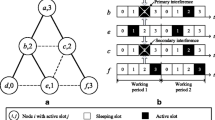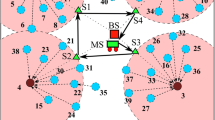Abstract
Energy-efficient data gathering in multi-hop wireless sensor networks was studied, considering that different node produces different amounts of data in realistic environments. A novel dominating set based clustering protocol (DSCP) was proposed to solve the data gathering problem in this scenario. In DSCP, a node evaluates the potential lifetime of the network (from its local point of view) assuming that it acts as the cluster head, and claims to be a tentative cluster head if it maximizes the potential lifetime. When evaluating the potential lifetime of the network, a node considers not only its remaining energy, but also other factors including its traffic load, the number of its neighbors, and the traffic loads of its neighbors. A tentative cluster head becomes a final cluster head with a probability inversely proportional to the number of tentative cluster heads that cover its neighbors. The protocol can terminate in O(n/lg n) steps, and its total message complexity is O(n 2/lg n). Simulation results show that DSCP can effectively prolong the lifetime of the network in multi-hop networks with unbalanced traffic load. Compared with EECT, the network lifetime is prolonged by 56.6% in average.
Similar content being viewed by others
References
ESTRIN D, GIROD L, POTTIE G, SRIVASTAVA M. Instrumenting the world with wireless sensor networks [C]// Proc of the Int’l Conf on Acoustics, Speech, and Signal Processing (ICASSP 2001). Salt Lake City, UT, USA, 2001: 2033–2036.
LI J Z, GAO H, Survey on sensor network research [J]. Journal of Computer Research and Development, 2008, 45(1): 1–15.
TAN Chang-geng, XU Ke, WANG Jian-xin, CHEN Song-qiao. A sink moving scheme based on local residual energy of nodes in wireless sensor networks [J]. Journal of Central South University of Technology, 2009, 16(2): 265–268.
GAO S, ZHANG H K. Optimal path selection for mobile sink in delay-guaranteed sensor networks [J]. Acta Electronica Sinica, 2011, 39(4): 742–747.
AKYILDIZ L F, SU W, SANKARASUBRAMANIAM Y. A survey on sensor networks [J]. IEEE Communications, 2002, 40(8): 102–114.
LIU M, CAO J N, CHEN G H, CHEN L J, WANG X M, GONG H G. EADEEG: An energy-aware data gathering protocol for wireless sensor networks [J]. Journal of Software, 2007, 18(5): 1092–1109.
ZHOU X L, WU M, XU J B. BPEC: An energy-aware distributed clustering algorithm in WSNs [J]. Journal of Computer Research and Development, 2009, 46(5): 723–730.
YOUNIS O, FAHMY S. HEED: A hybrid, energy-efficient, distributed clustering approach for ad hoc sensor networks [J]. IEEE Transactions on Mobile Computing, 2004, 3(4): 366–379.
HEINZELMAN W, CHANDRAKASAN A, BALAKRISHNAN H. Energy-efficient communication protocol for wireless microsensor networks [C]// Proc of the 33rd Annual Hawaii International Conference on System Sciences. Maui, HI, USA: IEEE Computer Society, 2000: 3005–3014.
LIU X H, LI F M, KUANG H L, FANG Y L. A distributed and directed clustering algorithm based on load balance for wireless sensor network [J]. Journal of Computer Research and Development, 2009, 46(12): 2044–2052.
YANG J, ZHANG D Y, ZHANG Y Y, WANG Y. Cluster-based data aggregation and transmission protocol for wireless sensor networks [J]. Journal of Software, 2010, 21(5): 1127–1137.
WEI Da-li, NAVARATNAM P, GLUHAK A, TAFAZOLLI R. energy-efficient clustering for wireless sensor networks with unbalanced traffic load [C]// Proc of the IEEE Wireless Communications and Networking Conference (WCNC 2010). Sydney, NSW, Australia, 2010: 250–256.
ALBATH J, THAKUR M, MADRIA S. Energy Constrained dominating set for clustering in wireless sensor networks [C]// Proc of 24th IEEE International Conference on Advanced Information Networking and Applications (AINA 2010). 2010.
KIM Dongh-yun, WANG Wei, LI Xian-yue, ZHANG Zhao, WU Wei-li. A new constant factor approximation for computing 3-connected m-dominating sets in homogeneous wireless networks [C]// Proc of The 29th IEEE Conference on Computer Communications (INFOCOM 2010). San Diego, CA, USA, 2010: 1–9.
DING Ling, GAO Xiao-feng, WU Wei-li, LEE Won-jun, ZHU Xu, DU Ding-zhu. Distributed construction of connected dominating sets with minimum routing cost in wireless networks [C]// IEEE 30th International Conference on Distributed Computing Systems (ICDCS 2010). Genova, Italy, 2010: 448–457.
MHATRE V P, ROSENBERG C, KOFMAN D, MAZUMDAR R, SHROFF N. A minimum cost heterogeneous sensor network with a lifetime constraint [J]. IEEE Transactions on Mobile Computing, 2005, 4(1): 4–15.
LONG Jun, GUI Wei-hua. Node deployment strategy optimization for wireless sensor network with mobile base station [J]. Journal of Central South University of Technology, 2012, 19(2): 453–458.
MHATRE V, ROSENBERG K. Design guidelines for wireless sensor networks: Communication, clustering and aggregation [J]. Ad Hoc Network Journal, 2004, 2(1): 45–63.
Author information
Authors and Affiliations
Corresponding author
Additional information
Foundation item: Projects(61173169, 61103203) supported by the National Natural Science Foundation of China; Project(NCET-10-0798) supported by the Program for New Century Excellent Talents in University of China; Project supported by the Post-doctoral Program and the Freedom Explore Program of Central South University, China
Rights and permissions
About this article
Cite this article
Kui, Xy., Wang, Jx. & Zhang, Sg. Energy-balanced clustering protocol for data gathering in wireless sensor networks with unbalanced traffic load. J. Cent. South Univ. 19, 3180–3187 (2012). https://doi.org/10.1007/s11771-012-1393-7
Received:
Accepted:
Published:
Issue Date:
DOI: https://doi.org/10.1007/s11771-012-1393-7




